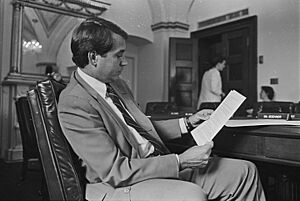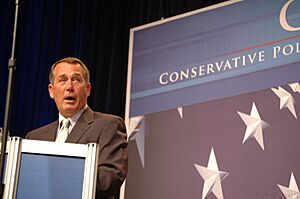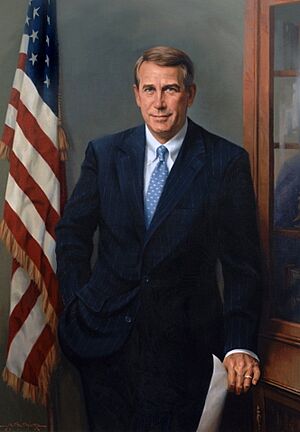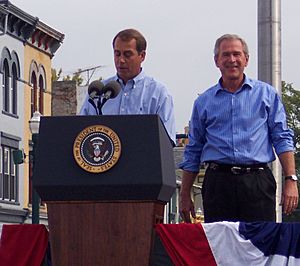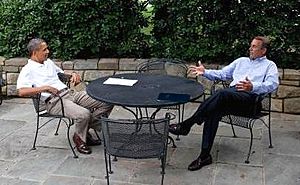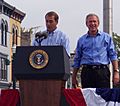John Boehner facts for kids
Quick facts for kids
John Boehner
|
|||||||||||||||||||||||||||||||||||||||||||||||||||||||||||
|---|---|---|---|---|---|---|---|---|---|---|---|---|---|---|---|---|---|---|---|---|---|---|---|---|---|---|---|---|---|---|---|---|---|---|---|---|---|---|---|---|---|---|---|---|---|---|---|---|---|---|---|---|---|---|---|---|---|---|---|
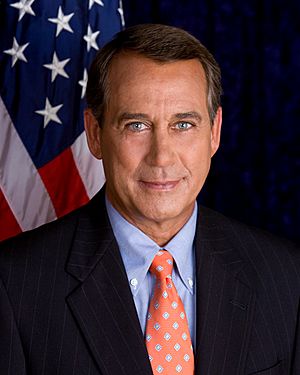
Official portrait, 2009
|
|||||||||||||||||||||||||||||||||||||||||||||||||||||||||||
| 53rd Speaker of the United States House of Representatives | |||||||||||||||||||||||||||||||||||||||||||||||||||||||||||
| In office January 5, 2011 – October 29, 2015 |
|||||||||||||||||||||||||||||||||||||||||||||||||||||||||||
| Preceded by | Nancy Pelosi | ||||||||||||||||||||||||||||||||||||||||||||||||||||||||||
| Succeeded by | Paul Ryan | ||||||||||||||||||||||||||||||||||||||||||||||||||||||||||
|
|||||||||||||||||||||||||||||||||||||||||||||||||||||||||||
| Member of the U.S. House of Representatives from Ohio's 8th district |
|||||||||||||||||||||||||||||||||||||||||||||||||||||||||||
| In office January 3, 1991 – October 31, 2015 |
|||||||||||||||||||||||||||||||||||||||||||||||||||||||||||
| Preceded by | Buz Lukens | ||||||||||||||||||||||||||||||||||||||||||||||||||||||||||
| Succeeded by | Warren Davidson | ||||||||||||||||||||||||||||||||||||||||||||||||||||||||||
| Member of the Ohio House of Representatives from the 57th district |
|||||||||||||||||||||||||||||||||||||||||||||||||||||||||||
| In office January 3, 1985 – December 31, 1990 |
|||||||||||||||||||||||||||||||||||||||||||||||||||||||||||
| Preceded by | Bill Donham | ||||||||||||||||||||||||||||||||||||||||||||||||||||||||||
| Succeeded by | Scott Nein | ||||||||||||||||||||||||||||||||||||||||||||||||||||||||||
| Personal details | |||||||||||||||||||||||||||||||||||||||||||||||||||||||||||
| Born |
John Andrew Boehner
November 17, 1949 Reading, Ohio, U.S. |
||||||||||||||||||||||||||||||||||||||||||||||||||||||||||
| Political party | Republican | ||||||||||||||||||||||||||||||||||||||||||||||||||||||||||
| Spouse |
Deborah Gunlack
(m. 1973) |
||||||||||||||||||||||||||||||||||||||||||||||||||||||||||
| Children | 2 | ||||||||||||||||||||||||||||||||||||||||||||||||||||||||||
| Education | Xavier University (BA) | ||||||||||||||||||||||||||||||||||||||||||||||||||||||||||
| Signature | |||||||||||||||||||||||||||||||||||||||||||||||||||||||||||
| Military service | |||||||||||||||||||||||||||||||||||||||||||||||||||||||||||
| Allegiance | |||||||||||||||||||||||||||||||||||||||||||||||||||||||||||
| Branch/service | |||||||||||||||||||||||||||||||||||||||||||||||||||||||||||
| Years of service | 1968 (8 weeks) | ||||||||||||||||||||||||||||||||||||||||||||||||||||||||||
John Andrew Boehner (born November 17, 1949) is an American former politician. He served as the 53rd Speaker of the United States House of Representatives from 2011 to 2015. A member of the Republican Party, he was a U.S. representative for Ohio's 8th district from 1991 to 2015. This district included areas near Cincinnati and Dayton.
Before becoming Speaker, Boehner was the House Minority Leader from 2007 to 2011. He was also the House Majority Leader from 2006 to 2007. He was first elected Speaker in January 2011 and re-elected twice. Boehner left the House of Representatives in October 2015. After leaving Congress, he joined a lobbying firm and became a board member for a tobacco company.
Contents
Early Life and Education
John Boehner was born in Reading, Ohio, on November 17, 1949. He was the second of twelve children. His parents were Mary Anne and Earl Henry Boehner. His family had German and Irish roots. He grew up in a small, two-bedroom house in Cincinnati, sharing one bathroom with his eleven brothers and sisters.
He started working at his family's bar when he was just 8 years old. This business was started by his grandfather, Andy Boehner, in 1938. John Boehner has lived in Southwest Ohio his whole life.
Boehner went to Moeller High School in Cincinnati. He played linebacker on the school's football team. After graduating in 1968, he joined the United States Navy. However, he was honorably discharged after eight weeks because of a back problem. He later earned a B.A. degree in business administration from Xavier University in 1977. He was the first person in his family to go to college. He worked several jobs for seven years to pay for his education.
Early Career in Politics
After graduating from college in 1977, Boehner worked for a small sales company in the plastics industry called Nucite Sales. He was promoted several times and eventually became the company's president. He left this job in 1990 when he was elected to Congress.
Before joining Congress, Boehner served on the board of trustees for Union Township, Butler County, Ohio, from 1981 to 1984. He then became a member of the Ohio House of Representatives from 1985 to 1990.
Serving in the U.S. House of Representatives
In 1990, Boehner ran for Congress. He was not well-known at the time. He won the Republican primary election with 49 percent of the vote. He then easily won against his Democratic opponent in the November election. He was re-elected to Congress 12 more times. Each time, he won by a large margin.
His closest elections were in:
- 2006: He won with 64% of the vote.
- 2008: He won with 68% of the vote.
- 2010: He won with 66% of the vote in a four-way race.
Early Influence and the Contract with America
During his first year in Congress, Boehner was part of a group called the "Gang of Seven." This group helped bring attention to issues in the House of Representatives. He also helped investigate the Congressional Post Office.
Later, in 1994, he worked with other Republican lawmakers on the Contract with America. This was a plan that helped Republicans win a majority in Congress. It was the first time they had done so in 40 years.
Republican Leadership Roles
From 1995 to 1999, Boehner was the House Republican Conference Chairman. This made him the fourth-highest ranking Republican in the House. During this time, he supported the Freedom to Farm Act. This law changed how the government supported farmers.
In 1997, some House Republicans tried to replace Speaker Newt Gingrich. Boehner was involved in these discussions. However, the plan did not work out.
After Republicans lost seats in the 1998 elections, the House Republican leadership changed. Boehner lost his position as conference chairman.
Leading the Education Committee
After President George W. Bush was elected, Boehner became chairman of the House Education and the Workforce Committee. He served in this role from 2001 to 2006. He helped create new laws, including the Pension Protection Act of 2006. He also supported a program that helped low-income children in Washington, D.C., choose their schools.
Boehner also worked with Senator Ted Kennedy to pass the No Child Left Behind Act of 2001. President George W. Bush signed this law in 2002. Boehner said this was his "proudest achievement" in his public service.
House Republican Leader
In 2005, Boehner ran for House Majority Leader. He campaigned as someone who wanted to reform government spending. He won the election among House Republicans.
After Republicans lost control of the House in the 2006 elections, Boehner was chosen as the Minority Leader. In this role, he was the main leader of the House Republicans. He was the Republican candidate for Speaker in 2006 and 2008, but lost both times to Nancy Pelosi.
As Minority Leader, Boehner was considered a very powerful member of Congress.
Speaker of the House (2011–2015)
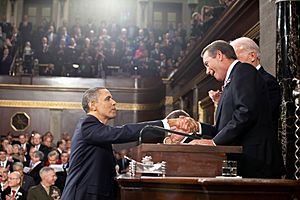
In the 2010 midterm elections, Republicans won many more seats and gained control of the House of Representatives. On November 17, 2010, House Republicans chose Boehner to be their candidate for Speaker. This meant he was almost certain to become Speaker when the new Congress started in January 2011. He officially became Speaker on January 5, 2011, taking the "gavel" (a symbol of authority) from outgoing Speaker Nancy Pelosi.
He was the first Speaker from Ohio in many years. As Speaker, he was still the leader of the House Republicans. However, by tradition, the Speaker usually does not take part in debates or vote on laws. He also did not serve on any House committees during his time as Speaker.
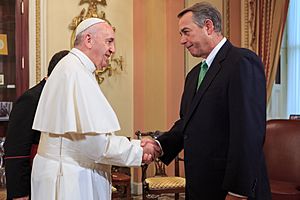
Boehner was re-elected as Speaker on January 3, 2013, at the start of the 113th United States Congress. He received 220 votes, which was just enough to win.
In July 2014, Boehner supported a lawsuit against President Obama. The lawsuit was about the President's actions on healthcare and immigration policies.
Resignation
On September 25, 2015, John Boehner announced that he would step down as Speaker and leave Congress at the end of October 2015. His resignation became official on October 31, 2015.
Political Views
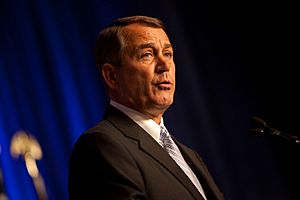
John Boehner has always been a Republican. He has signed the Taxpayer Protection Pledge, which means he promises to oppose tax increases.
When asked about climate change, Boehner said in 2014 that he was "not qualified to debate the science." He also criticized proposed government rules on coal-fired power plants.
In 2011, Boehner was against the military action in Libya led by NATO. In 2015, he supported the military action led by Saudi Arabia in Yemen. He said he praised the Saudis for protecting their country and region.
Later Career and Activities
After leaving Congress, Boehner continued to be involved in public discussions. In April 2016, he made headlines for his strong comments about Republican presidential candidate Ted Cruz. He also supported Donald Trump after Trump became the likely Republican nominee.
In August 2020, a spokesperson for Boehner said he would not endorse either President Trump or Joe Biden for the 2020 election. However, Boehner later confirmed he voted for Trump. He explained that he believed the most important thing a President does is nominate federal judges.
After the January 6 United States Capitol attack, Boehner called on Republicans to "awaken." He said the attack was "a disgrace." He also congratulated Biden on his victory. He continued to express his strong opinions about other politicians.
Boehner's book, On the House: A Washington Memoir, was published in April 2021. In the book, he shares his thoughts on various politicians and how the Tea Party movement influenced politics.
Even after leaving politics, Boehner received one vote for Speaker of the House in October 2023.
Business Ventures
On September 15, 2016, Boehner joined the board of a tobacco company called Reynolds American. .....
Legacy and Personal Life
When he retired, Politico described his time as Speaker. They noted that he came to power with the support of the Tea Party movement. However, this movement also caused him problems. He often disagreed with conservative members of his party on issues like government funding and taxes. But he also had successes, such as a trade deal passed by Congress.
Paul Kane of The Washington Post pointed out that Boehner never achieved the very large agreements he hoped for. He also suggested that Boehner's relaxed style did not fit well with some conservative Republicans.
Boehner and his wife, Debbie, married in 1973. They have two daughters, Lindsay and Tricia. Boehner is known for showing his emotions and sometimes crying during important events.
In 2016, Boehner received the Laetare Medal from the University of Notre Dame. This is a high honor for American Catholics.
Images for kids
-
Boehner introducing then-president George W. Bush in Troy, Ohio in 2003
-
Boehner speaking at the 2009 Conservative Political Action Conference
See also
 In Spanish: John Boehner para niños
In Spanish: John Boehner para niños


